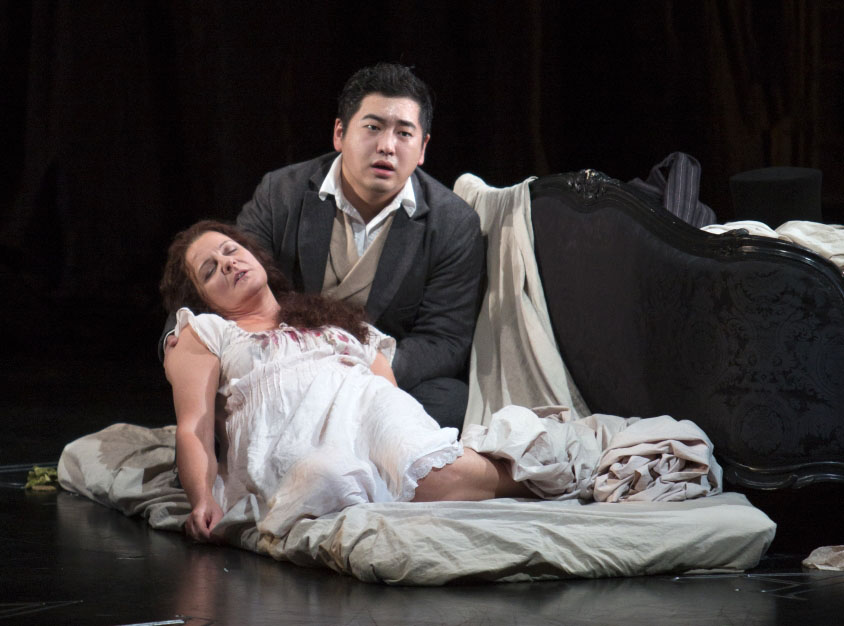
For operaphiles it is always a red-letter day when the Welsh National Opera comes to town. One of the joys of WNO on tour is that there is little sign of any penny pinching; talent is always of the highest order.
Kang Wang as Alfredo Germont, since being a finalist in last year’s Cardiff Singer of the World, has attained a maturity, which shows, paradoxically, in his characterization of the young man hopelessly in love with the celebrated courtesan, Violetta (Linda Richardson). It’s an important point since it makes absolute sense for his father, Giorgio Germont (Roland Wood) to go straight to reason with Violetta knowing that his son would have the strength to defy his wishes. His singing, particularly in the always emotionally charged duets is always with clarity and warmth.
Although the Belle Époque was some couple of decades after the writing of the opera (and original play by Dumas fils) it is presaged in the general air of opulence and exuberance conjured up by original director David McVicar and revival director, Sarah Crisp. The settings of designer Tanya McCallin achieve the near impossible by suggesting both that coming age of optimism and the oppressive morality which informs the line taken by Alfredo’s father. At the same time the sepulchral gloom of the dark set is constantly in tension with the gaiety of the society from which Violetta emerges as party-girl-in-chief. The irony is gently reinforced by the falling leaves at the beginning of the show, which reappear later on as Violetta’s consumptive condition advances.
With such a potentially gloomy set the lighting becomes more important than usual. The lighting design by Jennifer Tipton (Benjamin Naylor for the tour) is both atmospheric and un-intrusive. Particularly striking is the tableau assumed in the death scene where all the elements of the opera come together in a scene of sensitive pathos. Was ever death so beautiful?
The last brought out that quality in Ms Richardson of being able to ride with conviction the undulations of hope, ecstasy and despair, which flow through the opera. Not least of her impressive attributes is the ability to suggest power through fragility so even in her pomp we are not fooled by her apparent strength. Only in love does the facade drop to show what we the audience knew all along.
As I’ve had the pleasure to report before, the orchestra under James Southall is peerless. High emotion, romance and poignancy are each given their full expressive value revealing a sureness and clarity of conception.
Finally, it struck me that part of the reason for the continued success of this work, even after more than a century and a half, is that fundamentally the characters are not singing about themselves, but about us: our loves, passions, moral struggles and urge to nobility in the face of all our imperfections, folly and humanity.
★★★★☆ Graham Wyles 26th October 2018
Photo by Jane Hobson

